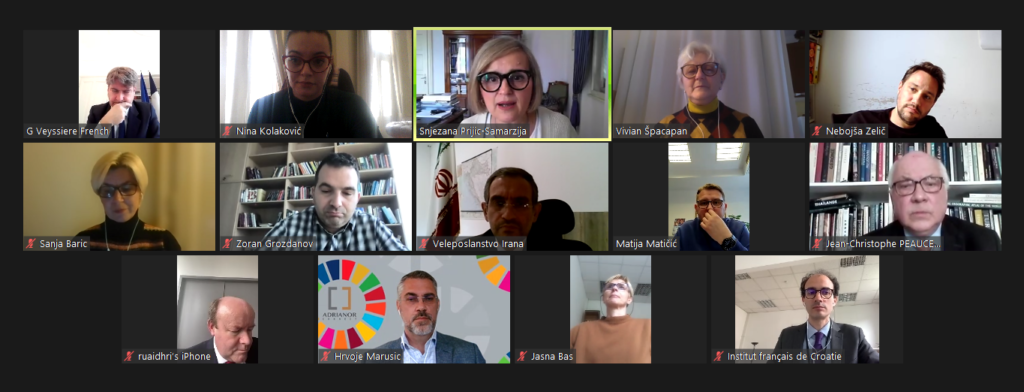In accordance with the current epidemiological measures, the second session of the Inter-religious Dialogue and Diplomacy Committee of the University of Rijeka was held on Wednesday, April 14, 2021, via the Zoom platform. Members of the Council, representatives of the University, religious communities and representatives from the ranks of diplomacy, through their work and activities seek to encourage interreligious dialogue, social engagement and social sensitivity.
The session was attended by:
- Msgr. Matija Matičić, Ph.D., Rector of the St. Vitus Cathedral in Rijeka, President,
- Prof. Snježana Prijić-Samaržija, Ph.D., UNIRI Rector,
- Prof. Sanja Barić, Ph.D., Rector’s Assistant for Study Programs and Institutional Policies,
- Ms. Vivian Špacapan, DMD, representative of the Jewish Community Rijeka,
- H.E. Mr. Parviz Esmaeili, Ambassador of the Islamic Republic of Iran to the Republic of Croatia,
- H.E. Mr. Ruaidhri Mark Dowling, Ambassador of Ireland to the Republic of Croatia,
- H.E. Mr. Gaël François Veyssiere, Ambassador of the French Republic to the Republic of Croatia,
- Mr. Guillaume Colin, Cultural Counsellor, Embassy of the French Republic to the Republic of Croatia,
- Ms. Jasna Bas, Attaché for Scientific and University Cooperation, French Institute in Zagreb,
- H.E. Mr. Jean-Christophe Peaucelle, Advisor for Religious Affairs, French Ministry of Foreign Affairs,
- H.E. Mr. Hrvoje Marušić, former Ambassador of the Republic of Croatia in the Kingdom of Norway,
- Assist. Prof. Nebojša Zelič, Ph.D., Head of the UNIRI Center for Peace and Conflict Studies, UNIRI Faculty of Humanities and Social Sciences,
- Assist. Prof. Zoran Grozdanov, Ph.D., Deputy Head of the UNIRI Center for Peace and Conflict Studies, University Center for Protestant Theology Matthias Flacius Illyricus,
- Ms. Nina Kolaković, Rector’s Office.
Speaking from the perspective of a foreigner living in Croatia, Ambassador Veyssiere commented on the current situation in Croatia, saying that the situation is praiseworthy, giving an example of Rijeka, which, as a true Port of Diversity, merges different cultures, nationalities, and religions.
Mr. Jean-Christophe Peaucelle, with three decades of experience in the French Ministry of Foreign Affairs, including past positions as Ambassador to Qatar, Consul General in Istanbul, and posts in Saudi Arabia, Jerusalem, and Iran, pointed out the often misunderstood and misinterpreted French word laïcité, which usually translates as ‘secularism’, and then implies skepticism or hostility rather than neutrality towards religion. As explained, in France there is a difference between secularization, a sociological concept relating to society, and laïcité, a legal concept relating to the state.
Madam Rector Prijić-Samaržija emphasized the importance of the education system in promoting interreligious dialogue, specifically through the introduction of new programs and educational activities that would teach the young about important facts of the modern world, including various religions and their underlying principles. She also mentioned that Rijeka is the first city in Croatia to introduce the subject of Civic Education in primary schools as an extracurricular activity, i.e. subject conducted once a week.
Professors Nebojša Zelič and Zoran Grozdanov briefly presented the work of the Center for Peace and Conflict Research, as well as projects in cooperation with the Norwegian Ministry of Foreign Affairs and the Church of Norway.
